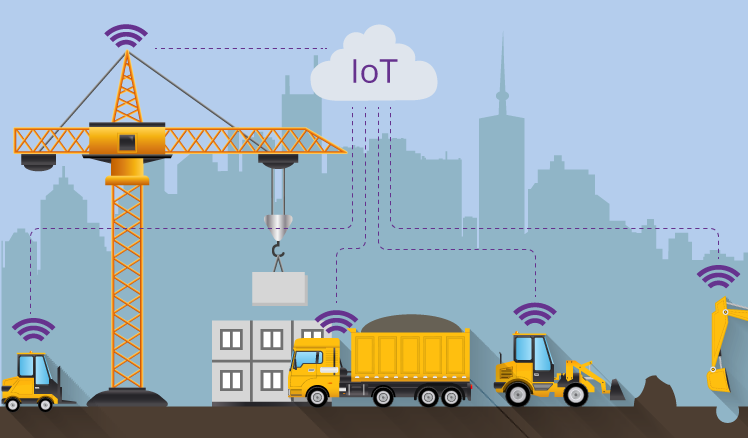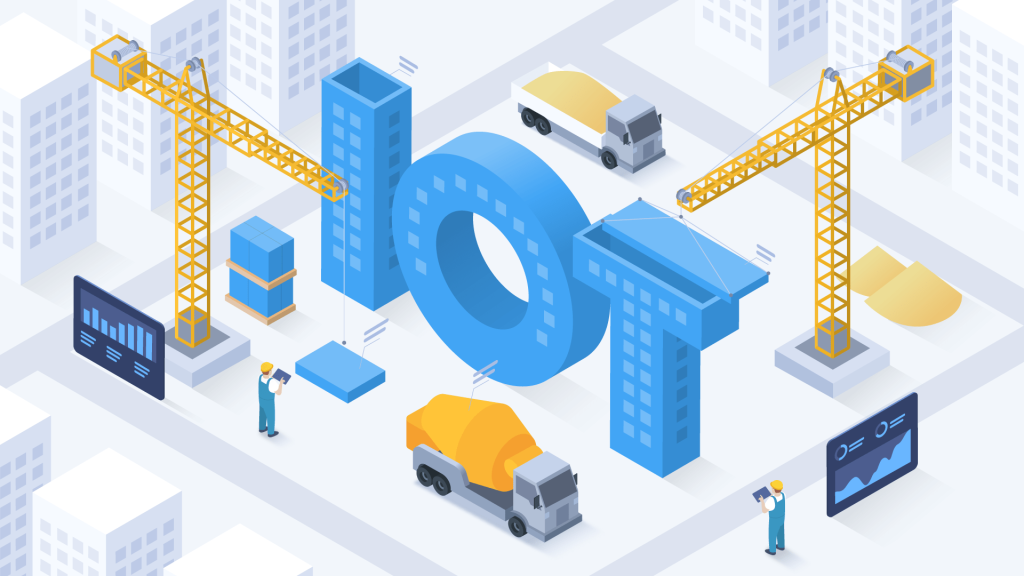
IoT in Construction: 10 Transformative Use Cases and Their Impact
By Udit Agarwal

The Internet of Things (IoT) rapidly transforms industries worldwide, and the construction sector is no exception. By embedding sensors and connectivity into construction equipment, materials, and processes, IoT enables more brilliant, efficient, and safer construction practices. Here’s a closer look at ten transformative use cases of IoT in construction and their profound impact on the industry.
Real-Time Equipment Monitoring
One of the most impactful applications of IoT in construction is the real-time monitoring of equipment. IoT sensors can track various parameters, such as engine performance, fuel consumption, and wear and tear. This data helps in predictive maintenance, allowing for repairs before equipment failure occurs. As a result, downtime is reduced, and operational efficiency is improved.
Site Safety and Hazard Detection
Safety is a top priority in construction, and IoT is crucial in enhancing site safety. Wearable devices with IoT sensors can monitor workers’ vital signs, detect falls, and provide real-time alerts for unsafe conditions. IoT-enabled cameras and sensors can also identify potential hazards, such as gas leaks or structural weaknesses, and notify site managers to take immediate action.
Smart Building Materials
IoT is revolutionizing the use of building materials through intelligent technology. For instance, concrete can be embedded with sensors to monitor its curing process, ensuring that it reaches optimal strength. Similarly, smart materials can adapt to environmental conditions, such as adjusting insulation based on temperature changes. These innovations lead to higher quality and more durable structures.
Automated Construction Processes
IoT is accelerating automation in construction. Robotics and automated machinery connected through IoT networks can precisely perform repetitive and hazardous tasks. For example, IoT-enabled drones can survey construction sites, providing real-time data and images. Automated machinery can handle bricklaying or concrete pouring, improving speed and accuracy.
Efficient Resource Management
IoT enhances resource management by providing detailed insights into material usage and inventory levels. Sensors can track the quantity of materials used and remaining, helping to reduce waste and avoid over-ordering. This data also facilitates more accurate budgeting and scheduling, ensuring that resources are used efficiently throughout construction.
Enhanced Project Management
IoT technology is streamlining project management. Sensors and devices provide real-time data on project progress, allowing managers to monitor tasks and milestones remotely. This information can be integrated into project management software, facilitating better decision-making and ensuring that projects stay on schedule and within budget.
Energy Efficiency and Sustainability
Sustainability is a growing construction concern, and IoT contributes significantly to energy efficiency. Intelligent building systems can monitor and control energy consumption based on occupancy and environmental conditions, such as lighting, heating, and cooling. This reduces energy costs and supports green building initiatives and compliance with environmental regulations.
Enhanced Collaboration and Communication
IoT technology fosters better collaboration and communication among project stakeholders. Connected devices and platforms enable real-time information sharing, such as blueprints, project updates, and changes. This improves coordination between architects, engineers, contractors, and clients, reducing misunderstandings and ensuring everyone is on the same page.

Advanced Structural Health Monitoring
Maintaining the integrity of structures over time is crucial, and IoT is enhancing structural health monitoring. Sensors embedded in buildings and infrastructure can continuously monitor stress, strain, and vibrations. This data helps identify potential issues before they become serious problems, allowing for timely maintenance and ensuring the long-term safety of structures.
Smart Logistics and Supply Chain Management
IoT is transforming logistics and supply chain management in construction. By tracking the location and condition of materials and equipment in real-time, IoT devices help optimize delivery schedules and reduce delays. Smart logistics systems can also predict and address potential supply chain disruptions, ensuring that materials arrive on time and in the right condition.
Impact on the Construction Industry
The impact of IoT on the construction industry is profound and multifaceted:
- Increased Efficiency: IoT technologies streamline processes, reduce downtime, and enhance resource management, leading to more efficient construction practices.
- Improved Safety: With real-time monitoring and hazard detection, IoT contributes to safer work environments and reduces the risk of accidents.
- Cost Savings: Predictive maintenance, reduced waste, and optimized resource management translate into significant cost savings.
- Enhanced Quality: Smart materials and automated processes improve the quality and durability of construction projects.
- Sustainability: IoT supports energy efficiency and sustainable building practices, aligning with environmental goals and regulations.
- Better Collaboration: Real-time data sharing and communication tools foster better collaboration among project stakeholders.
Conclusion
The integration of IoT in construction is ushering in a new era of innovation and efficiency. IoT transforms how construction projects are planned, executed, and managed, from real-time equipment monitoring to innovative materials and enhanced safety measures. As technology advances, the potential for IoT to drive further improvements in the construction industry is boundless, promising a future where construction is more innovative, safer, and more sustainable.